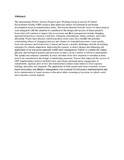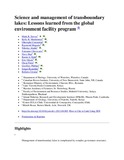| dc.contributor.author | Mark, R. Servos | |
| dc.contributor.author | Kelly, R. Munkittrick | |
| dc.contributor.author | Gheorghe, Constantin | |
| dc.contributor.author | Raymond, Mngodo | |
| dc.contributor.author | Nikolay, Aladine | |
| dc.contributor.author | Sansanee, Choowaew | |
| dc.contributor.author | Navy, Hap | |
| dc.contributor.author | Karen, A. Kidd | |
| dc.contributor.author | Odada, Eric O | |
| dc.contributor.author | Oscar, Parra | |
| dc.contributor.author | Geoffrey, Phillips | |
| dc.contributor.author | Sergei, Ryanzhin | |
| dc.date.accessioned | 2013-06-19T11:50:20Z | |
| dc.date.available | 2013-06-19T11:50:20Z | |
| dc.date.issued | 2013 | |
| dc.identifier.citation | N Hap, KA Kidd, E Odada, O Parra et al, Science and Management of Transboundary Lakes: Lessons Learned from the Global Environment Facility Program.Environmental Development- 2013 - Elsevier | en |
| dc.identifier.uri | http://www.sciencedirect.com/science/article/pii/S2211464513000389 | |
| dc.identifier.uri | http://erepository.uonbi.ac.ke:8080/xmlui/handle/123456789/36214 | |
| dc.description.abstract | The International Waters Science Project Lakes Working Group reviewed 58 Global Environment Facility (GEF) projects that addressed serious environmental and human development issues in transboundary lakes. The lessons learned from the review of these projects were integrated with the intention to contribute to the design and success of future projects. Issues that will continue to impact lake ecosystems and their management include changing agricultural practices, resource extraction, emerging contaminants, energy policies, and water allocation. Future lakes projects addressing these issues must also consider the potential confounding effects of changing land use and climate on watershed processes, water quality, food web structure and biodiversity. Current and future scientific challenges include developing strategies for climate adaptation, improving the capacity to detect change and enhancing the application of an ecosystem approach within lakes management. Failure to consider the unique physical and biological features and processes in lakes can be a barrier to effective remediation. The spatial and temporal variability in lakes and their often slow response to remedial actions need to be considered in the design of monitoring programs. Factors that improved the success of GEF transboundary projects included early and strong communication, engagement of stakeholders, rigorous peer review and international science teams linked to local capacity building and policy development. The application of both natural and socio-economic science based assessment, and adaptive management were essential for full project implementation and led to optimization of water resources allocation while sustaining ecosystems on which social and economic systems depend. | en |
| dc.language.iso | en | en |
| dc.publisher | University of Nairobi. | en |
| dc.title | Science and Management of Transboundary Lakes: Lessons Learned from the Global Environment Facility Program | en |
| dc.type | Article | en |
| local.publisher | Department of Geology, University of Nairobi, Nairobi, Kenya | en |


